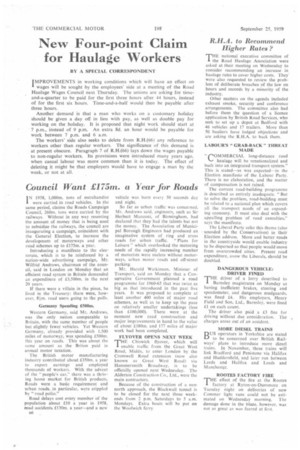Council Want £175m. a Year for Roads
Page 40

If you've noticed an error in this article please click here to report it so we can fix it.
I N 1958, 1,000m. tons of merchandise
were carried in road vehicles. In the same period, claims the Roads Campaign Council, 260m. tons were carried by the railways. Without in any way resenting the amount of money that is being used to subsidize the railways, the council are inaugurating a campaign, coincident with the General Election, to increase the development of motorways and other road schemes up to £175m. a year.
Introducing a manifesto to the electorate, which is to be reinforced by a nation-wide advertising campaign, Mr. Wilfrid Andrews, chairman of the council, said in London on Monday that an efficient road system in Britain demanded an expenditure of 13,500m. in the next 20 years.
It there were a villain in the piece, he lived in the Treasury: there were, however, 81m. road users going to the polls.
Germany Spending £500m.
Western Germany, said Mr. Andrews, was the only nation comparable to Britain, with the same number of people but slightly fewer vehicles. Yet Western Germany, already provided with 1.500 miles of motorway, was spending £500m. this year on roads. This was about the same amount as the Briton paid in annual motor taxation.
The British motor manufacturing industry contributed about £350m. a year to export earnings and employed thousands of workers. With the advent of the "people's car," there was a thriving home market for British products. Roads were a basic requirement and urban roads, in particular, were crippled by "road polio."
Road delays cost every member of the population about £10 a year in 1958, road accidents £130m. a year—and a new B6 vehicle was born every 50 seconds day and night.
So far as urban traffic was concerned, Mr. Andrews said, engineers, such as Sir Herbert Manzoni, of Birmingham, had declared that they had the talents but not the money. The Association of Municipal Borough Engineers had produced an imaginative system of ring and cross roads for urban traffic. "Plans for Leisure" which overlooked the motoring needs of the rapidly increasing number of motorists were useless without motorways, urban motor roads and off-street parking.
Mr. Harold Watkinson. Minister of Transport, said on Monday that a Conservative Government planned a road programme for 1960-65 that was twice as big as that introduced in the past five years. It was proposed to complete at least another 400 miles of major road schemes, as well as to keep up the pace on relatively smaller undertakings (less than £100,000). There were at the moment new road construction and major improvements in hand to the value of about £180m. and 177 miles of major work had been completed.
FLYOVER OPENS NEXT WEEK THE Chiswick flyover, which will enable traffic from the Great West Road. Middx, to enter London by the Cromwell Road extension (now also known as Great West Road) via Hammersmith Broadway. is to be officially opened next Wednesday. The Alderton Construction Co., Ltd., were the main contractors.
Because of the construction of a new north approach, the Blackwall tunnel is to be closed for the next three weekends from 2 p.m. Saturdays to 5 a.m. Mondays. Extra boats will be put on the Woolwich ferry.




















































































































